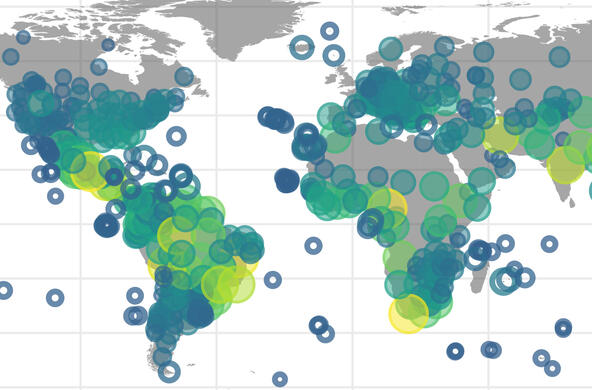Preserving habitats and encouraging biodiversity does wonders for plant and animal life, giving them room to thrive without human interference. In recent years some scientists have wondered if biodiversity might also help humans, protecting us from infectious diseases that spread from nonhuman animals to people.
The idea first started with ecologists Richard Ostfeld and Felicia Keesing. They called it the "dilution effect," a theory based on an in-depth look at Lyme disease and one of its primary hosts, the white-footed mouse. They found that in areas with greater biodiversity, specifically, more host species, the risk of Lyme disease to humans was actually reduced.
The Cary Institute describes the phenomenon this way:
"When host diversity is high, there is a lower probability that ticks will feed on a white-footed mouse host. Larval ticks are less likely to become infected with B. burgdorferi when they feed on other vertebrate animals, such as chipmunks, lizards, or ground-dwelling birds. When ticks obtain their larval blood meal without becoming infected, they are not dangerous to humans when they feed as nymphs the following year."
Now, that theory is getting some extra padding, with two more recent studies backing up its claims. And not just with Lyme disease. In 2014 researchers studied data on diseases, public health services, climatic factors and conservation policies in the Brazilian Amazon and found that incidences of malaria, acute respiratory infection (ARI) and diarrhea were reduced in protected areas.
The authors concluded that incidence rates of those illnesses would be reduced by increasing protected areas and malaria rates could be lessened even more by restricting roads and mining. The authors said, "Although these relationships are complex, we conclude that interventions to preserve natural capital can deliver cobenefits by also increasing human (health) capital."
A 2015 study found similar results, investigating the claim that the rise in disease and the fall of biodiversity were directly related. They too, based on the data, believe that the two are linked, noting that "declines in biodiversity could increase human and wildlife diseases and decrease crop and forest production."
That's not to say that these studies prove the dilution effect without a doubt. As the authors of the Brazilian Amazon research wrote, the evidence is "thin" or, perhaps more accurately, in need of further research.
Not everyone is convinced, some believing that other factors could be to blame for the link between a lack of biodiversity and an increase in disease. Or it might be true in some cases, such as Lyme, and not true in others. The correlation would need to be investigated on a case by case basis.
It's safe to say that biodiversity is important, whether for human health or the health of the planet. However, due to invasive species, the impact of climate change and humanity's consumption of Earth's resources, biodiversity has long been on the decline.






